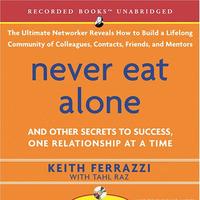9. CHAPTER 2 - Don't Keep Score
CHAPTER 2 Don't Keep Score
There is no such thing as a "self-made" man.
We are made up of thousands of others. Everyone who has ever done a kind deed for us, or spoken one word of encouragement to us, has entered into the make-up of our character and of our thoughts, as well as our success. —GEORGE BURTON ADAMS When I give talks to college and grad students, they always ask me, What are the secrets to success?
What are the unspoken rules for making it big? Preferably, they'd like my response wrapped up in a tight package and tied with a neat little bow. Why not? I wanted the same thing at their age. "So you want the inside scoop," I respond.
"Fair enough. I'll sum up the key to success in one word: generosity. Then I pause, watching the faces of the kids in the crowd as they look back at me with quizzical expressions.
Half the group thinks I'm about to tell them a joke; the other half thinks they would have been better off getting a beer rather than attending my talk. I go on to explain that when I was young, my father, a Pennsylvania steelworker, wanted more for me than he ever had.
And he expressed this desire to a man whom up until that moment he had never met, the CEO of his company, Alex McKenna. Mr. McKenna liked my dad's moxie and helped me get a scholarship to one of the best private schools in the country, where he was a trustee. Later, Elsie Hillman, chairwoman of the Pennsylvania Republican Party, whom I first met after she read in the New York Times about my unsuccessful bid for New Haven City Council in my sophomore year at Yale, lent me money and advice and encouraged me to attend business school.
By the time I was your age, I tell the students, I had been afforded one of the best educational opportunities in the world, almost purely through the generosity of others.
"But," I continue, "here's the hard part: You've got to be more than willing to accept generosity.
Often, you've got to go out and ask for it. Now I get that look of instant recognition.
Almost everyone in the room has had to reach out for help to get a job interview, an internship, or some free advice. And most have been reluctant to ask. Until you become as willing to ask for help as you are to give it, however, you are only working half the equation. That's what I mean by connecting.
It's a constant process of giving and receiving—of asking for and offering help. By putting people in contact with one another, by giving your time and expertise and sharing them freely, the pie gets bigger for everyone. This karma-tinged vision of how things work may sound naive to those who have grown cynical of the business world.
But while the power of generosity is not yet fully appreciated, or applied, in the halls of corporate America, its value in the world of networks is proven. For example, I enjoy giving career advice and counseling.
It's almost a hobby. I've done this with hundreds of young people, and I get enormous satisfaction hearing from them later on as their careers progress. There are times when I can a make a big difference in a young person's life. I can open a door or place a call or set up an internship—one of those simple acts by which destinies are altered. But too often the offer is refused. The recipient will say, "Sorry, but I can't accept the favor because I'm not sure I'll ever be able to repay you"; or "I'd rather not be obligated to anyone, so I'll have to pass.
Sometimes, they'll insist right there and then that they return the favor somehow. To me, nothing is as infuriating as encountering such blindness about how things work. Nor is it, as one might assume, a generational issue. I've gotten similar reactions from people of all ages and in all walks of life.

